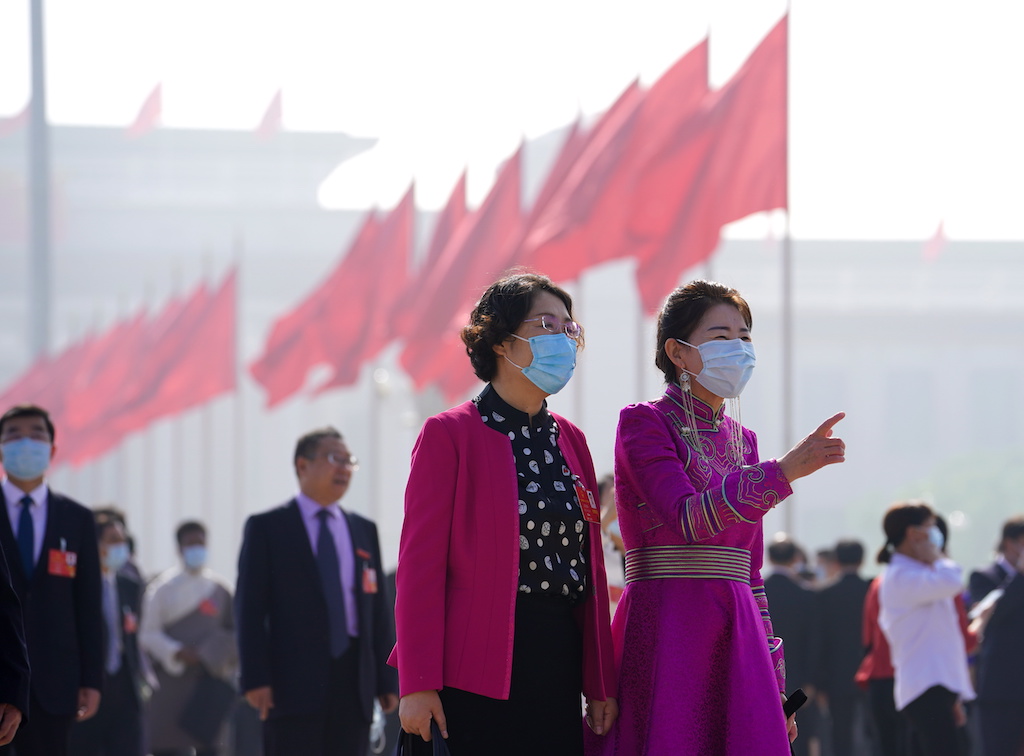Global fragmentation will have severe economic consequences
The ruling party in China is tightening control over the country and fanning nationalist sentiments in response to criticism from abroad. International tension is rising. Yet Europe very much depends on doing business with the Middle Kingdom to maintain its prosperity.

Last Friday morning, nearly 3,000 delegates of the National People’s Congress (NPC) gathered in Beijing’s Great Hall of the People for China’s most important yearly political event. This year, the Chinese People’s Consultative Conference was delayed due to the pandemic and is to last only seven days instead of the usual two weeks. The event takes place against the backdrop of the country’s moves to restart its economy and Beijing’s intensifying crackdown on treaty-guaranteed freedoms in Hong Kong.
China’s rulers face several pressing issues at home and abroad. For the last 30 years, its communist party’s legitimacy was based on steady increases in prosperity. The party accomplished this objective with an iron-fisted rule. An accumulation of very high debt is another cost of the Chinese growth model.
Beijing’s hardening stance
On the international scene, China proceeded cautiously at first. Gradually, however, its activities have become more assertive. Beijing sees a chance to become a new global hegemon. As supplies and new markets need to be provided for China’s fast-growing economy, the country has put much emphasis on securing its trade routes, both overland and across the seas.
China is expanding its navy at an unprecedented pace. Beijing is also working to increase its global influence by financing other countries’ development projects and dispensing economic aid. Its Belt and Road Initiative (BRI) is meant to institutionalize China’s sway, both economic and political, in critical transportation areas of Central Asia, along the coasts of the Indian Ocean and all the way to Africa, the Mediterranean Basin and Southeast Europe.
China’s economy is still expanding despite the coronavirus disruption and the trade conflict with the U.S., but the benefits to the population are diminishing.
Three years ago, China’s President Xi Jinping was hailed as a hero of free trade at the World Economic Forum in Davos. China’s influence in the United Nations and other international organizations was soaring. In Europe and elsewhere, the country was perceived by many nations as a success story and a friendly partner. Chinese companies, state-owned and private, purchased significant stakes in successful European businesses. When conflicts over trade began to surface, United States President Donald Trump was squarely blamed. China’s harmful trading and economic practices were ignored.
Things have changed since. Prosperity in China is no longer growing at a brisk pace. The country’s economy is still expanding despite the coronavirus disruption and the trade conflict with the U.S., but the benefits to the population are diminishing. In this situation, the regime feels compelled to tighten its control over citizens for fear of domestic protests. The cruel measures taken against Uighurs, an indigenous ethnic group in China’s far west that has a record of disagreements with Beijing’s policies, and the blunt handling of the demonstrations in Hong Kong are clear signs of how the regime intends to hang on.
Mr. Xi has already consolidated and extended his grip on power by changing the rules limiting the length of the presidential term. He appears determined to push through China’s expansion strategies quickly rather than over decades, as was Beijing’s practice in the past.
At present, political and nationalist narratives in China are developing an edge. The regime also uses its apparent success in containing the coronavirus on its territory to boost its international image. The World Health Organization is giving Beijing all the help it can on this front. However, this crude propaganda does not impress Washington and the Europeans who, somewhat belatedly, have become more cautious in dealing with today’s Middle Kingdom. Some of the governments participating in the BRI are also concerned.
Europe’s risks
However, it appears that China is going to stick to its guns, so to speak, and prepare for a real conflict rather than search for peaceful solutions. It continues to build up its nuclear capabilities as a deterrent and is spending vast sums on defense. The Chinese are also increasing their strategic reserves of all kinds of emergency supplies for the military and the civilian population.
Aggressive, nationalist policies are often utilized to stabilize regimes in times of economic difficulty. Beijing’s prime target now seems to be Taiwan. The successful island state, formerly part of China, is a thorn in the communist party’s flesh and the strategic crux of any U.S.-China conflict.
An outright war appears unlikely. However, this situation is deepening divides in global politics and economy. Trading will become more difficult if new barriers are raised. China might also work to move the existing payment system away from the U.S. dollar. A new bipolar world might result.
Europe’s economy would suffer the most. There, a significant part of the growth of the past 30 years has come from doing business with China as it developed. In 2019, trade with the Middle Kingdom accounted for 9.3 percent of the European Union’s exports and 18.7 percent of its imports. In the cases of Germany and Austria, two strongly trade-oriented economies, the figures are, respectively, 7.2 percent and 10.0 percent for exports, and 10.0 percent and 7.8 percent for imports. Fewer exports to China may dwarf the already anemic growth rate in Europe, while reduced imports could trigger inflation.
The economic effects of this looming fragmentation can become quite dramatic for some export-oriented industries in Europe as well as the European tourism sector.
